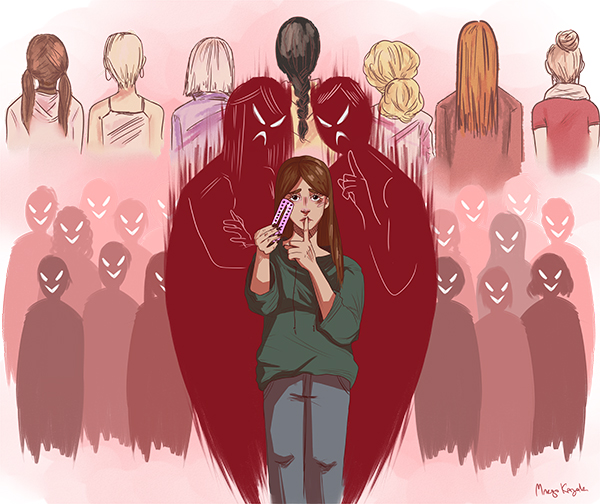Birth control stigma casts shadow on other reasons for use

Illustration by Margo Kazak
November 12, 2018
Swallowing a birth control pill every night only takes a few seconds out of junior Jenny Wallace’s* daily routine. Yet in this simple act, Wallace feels she gains the power to take control of her body and prevent her painful monthly menstruation from getting in the way of the normal activities of her life. Packed in every tiny white capsule are rumours of sex and pregnancy, but that is something Wallace is willing to sacrifice in order to do what is right for herself and her health.
After being on a combination birth control pill, which contains both progesterone and estrogen, for eight months, Wallace says her hormone regulation has improved immensely. She used to suffer irregular and prolonged periods of menstruation, accompanied by intense physical pain including cramping, fatigue and headaches. After visiting a gynecologist, Wallace says she was somewhat surprised by being offered contraception because she was not sexually active.
“At first, I was kind of confused as to why I was being suggested [to take birth control] because I just thought it was to prevent pregnancy, so I was confused that it was an option for me,” Wallace said. “It took a lot of explaining during the doctor’s visit [as to] what [birth control] would do to my hormones and that it [does] a lot more than just preventing pregnancy.”
Sophomore Kayla Dunn* believes there exists a stigma behind birth control use among teenagers, one that puts pressure on the user to be secretive or ashamed. She says this stigma is exemplified by parents who are unwilling to talk to their daughters about hormonal contraception. Despite currently being on the birth control pill for hormone regulation and clearing acne, Dunn says it was a struggle to initially go on it, due to her parents’ opposition.
“[My mom] said immediately, ‘If you [go on] birth control you would have sex.’ I [told her] that wasn’t the case,” Dunn said. “I couldn’t convince my mom. It wasn’t until I told my doctor everything, [and my doctor] had to tell to tell my mom that it would be good for me, and it really did help. My mom didn’t even acknowledge that it could be used for other health reasons until she was shown the facts.”
Similarly, Brenna Weidman, licensed clinical professional counselor at Youth Services of Glenview/Northbrook, believes that the preconceptions many parents have about birth control may be a result from the religious beliefs that premarital sex is wrong, or other concerns for the health of their child.
“Potentially, then there is fear in a parent that, ‘Oh, now maybe my kid thinks they can have unprotected sex or whatever [once they are on birth control],’” Weidman said. “They think it [will eventually result in their child] being sexually active.”
Weidman emphasizes that contraceptive use does not always correlate to its use as pregnancy control, as many parents think. Weidman explains that this stigma does not exclusively exist among parents; it is largely popularized by teen culture.
“Potentially, [girls on birth control] could feel shame about being on birth control if they’re being labeled [as something negative], or that’s what they’re fearful of being labeled as,” Weidman said. “That could create some stigma around birth control and therefore kind of result in people being ashamed that they’re on it instead of empowered by it.”
Furthermore, Wallace believes that the stigma is detrimental to creating an environment that encourages healthy communication regarding contraception use, as it pertains to regulating hormones and relieving other health problems.
“I think [the stigma] makes people a little more cautious and uncomfortable talking about [contraception] with their doctors or their parents or their friends, because they don’t want to have that judgement [that they are sexually active], “ Wallace said. “It kind of just makes for a hostile environment for people who are struggling with issues, like period issues or period pain, to talk about it [in a safe way].”
Health Teacher Laura Duffy explains the main purpose for contraception is to prevent pregnancy. She says hormonal contraception is only available for women, and side effects such as regulating menstruation and clearing acne can be other primary uses that appeal to patients. Duffy explains that hormonal contraception is primarily made to prevent females from ovulating irregularly.
“Hormonal contraception stops the flow of FSH (follicle stimulating hormone) which causes a female to not ovulate,” Duffy said. “It thickens up the cervical mucus which makes it more difficult for sperm to penetrate, and it thins the uterine lining. It will limit the amount of build up of the endometrium which means that [the user will] have shorter periods and more predictable periods. A lot of times, women take contraception not to [prevent pregnancy], but to help control periods. Some women will take hormonal contraception to resist the size of cysts that can be in their ovaries, and some women take hormonal contraception to clear up their skin and their acne.”
Though both Wallace and Dunn were successful in obtaining contraceptives, Weidman says that many teens are not because they fear the preconceived notions. She explains that this fear of judgement oftentimes creates an obstacle for teens receiving the medicine they need.
“If teens don’t know [if] they can get it somewhere without their parents knowing about it, I think that kinda stops them too because they don’t wanna have that conversation with parents about going on birth control,” Weidman said.
Junior Sebastian Hayes* believes there to be a stigma behind contraception in which girls are often branded as “hoes” when people find out that they are on birth control. He thinks people sometimes assume a woman’s birth control use is compensation for high levels of sexual activity. Hayes states that this preconception is unfounded: it does not apply to him and his girlfriend, and he believes it is not true for many people. Though Hayes’ girlfriend’s decision to get an intrauterine device (IUD) —another form of birth control that is implanted in the user’s uterus and administers progestin—was impacted by her sexual activity, Hayes explains that his view of her remained unchanged.
“When [my girlfriend] decided to get the IUD , my perception [of] her did not change at all really since we both thought it was a good idea,” Hayes said. “She’s still the same person, but on a form of birth control now.”
Senior Daniel Vega* says that he understands why there might be a stigma around the use of contraceptives, but he believes that people are usually open-minded and accepting because it means that girls are protecting themselves. According to Vega, he was unaware of the different uses of birth control. He also explains that any form of contraception is a smart decision, especially for a sexually active couple.
“I was more confident in being protected with [my sexual partner] since the chances of an accidental pregnancy were lowered,” Vega said. “I felt that I was not at risk.”
Duffy says she questions if there is still a stigma that comes along with using contraception. She believes that in this day and age, there is more of a stigma for kids who are sexually active and choose not to use a form of contraception. However, Duffy believes it is natural to think a woman on hormonal contraception is sexually active if one doesn’t know the other possible reasons females take that form of contraception.
“I think [the stigma that women on hormonal contraception are sexually active is] probably there,” Duffy said. “I think that being human, if I was a brother who found my sister’s hormonal contraception I would maybe be like, ‘Oh, so that’s what’s going on.’ I do think that’s kind of where people tend to go, which is why we try to teach that that’s not the only reason [a woman may be taking birth control].”
Weidman, like Duffy, says she hopes that the stigma of birth control use among teenagers has died down; she believes everyday culture has developed a more accepting, open attitude towards being sexually active. Wallace says she has gained a new sense of empowerment through taking control of her body in a way that is perfectly healthy and responsible to her.
“This is an example of me being able to prove a stigma wrong, and being able to have my own experience with it,” Wallace said. “[Birth control] empowered me in that I was able to put myself and my health above a harmful stigma and was able to do what was right for myself.”
Health Teacher Courtney Middleton agrees that students need to be properly educated about the uses of contraception.
“[It’s important to educate] people who aren’t using [birth control], but [make] sure that the person who is using a hormonal contraception for a different reason [other than to prevent pregnancy is also educated] so that they can share that information,” Middleton said. “[If something] doesn’t affect you, sometimes you don’t [care to] look into or educate yourself on [that thing], so we talk to kids about it in class, but when you’re a kid that’s taking hormonal contraception for a different reason, sharing that and educating people as to why you might be using it could be [valuable].”
Weidman also believes the stigma about hormonal birth control may only be stopped once all women are able to understand and educate themselves. By disregarding the stigma that women believe in, or were taught to believe in, women begin truly supporting one another in their decisions over their own body.
“In terms of work that needs to be done, [oftentimes], judgement comes from other females,” Weidman said. “Female-to-female shaming can get pretty bad. What we need to work on in order to do that [is to start] encouraging girls to stand together rather than label or bring each other down.”
*names have been changed













